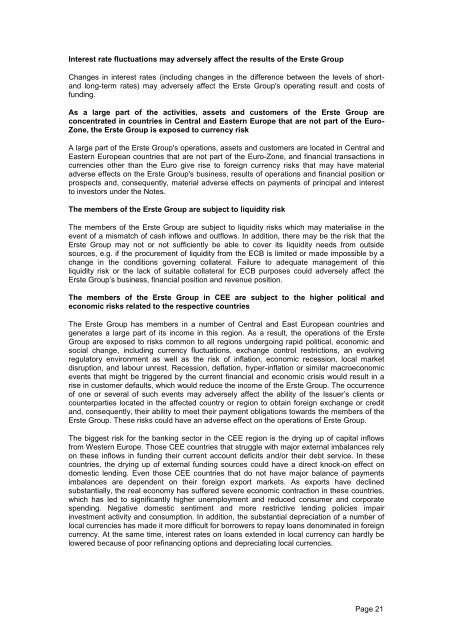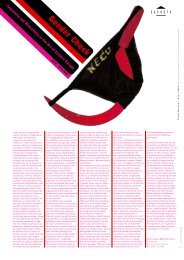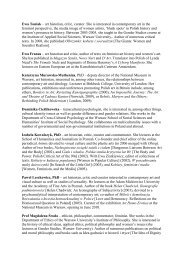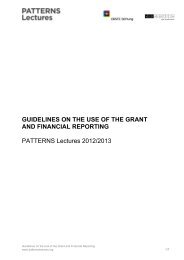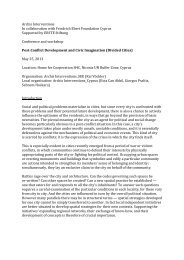DIE ERSTE österreichische Spar-Casse ... - ERSTE Stiftung
DIE ERSTE österreichische Spar-Casse ... - ERSTE Stiftung
DIE ERSTE österreichische Spar-Casse ... - ERSTE Stiftung
Create successful ePaper yourself
Turn your PDF publications into a flip-book with our unique Google optimized e-Paper software.
Interest rate fluctuations may adversely affect the results of the Erste Group<br />
Changes in interest rates (including changes in the difference between the levels of short-<br />
and long-term rates) may adversely affect the Erste Group's operating result and costs of<br />
funding.<br />
As a large part of the activities, assets and customers of the Erste Group are<br />
concentrated in countries in Central and Eastern Europe that are not part of the Euro-<br />
Zone, the Erste Group is exposed to currency risk<br />
A large part of the Erste Group's operations, assets and customers are located in Central and<br />
Eastern European countries that are not part of the Euro-Zone, and financial transactions in<br />
currencies other than the Euro give rise to foreign currency risks that may have material<br />
adverse effects on the Erste Group's business, results of operations and financial position or<br />
prospects and, consequently, material adverse effects on payments of principal and interest<br />
to investors under the Notes.<br />
The members of the Erste Group are subject to liquidity risk<br />
The members of the Erste Group are subject to liquidity risks which may materialise in the<br />
event of a mismatch of cash inflows and outflows. In addition, there may be the risk that the<br />
Erste Group may not or not sufficiently be able to cover its liquidity needs from outside<br />
sources, e.g. if the procurement of liquidity from the ECB is limited or made impossible by a<br />
change in the conditions governing collateral. Failure to adequate management of this<br />
liquidity risk or the lack of suitable collateral for ECB purposes could adversely affect the<br />
Erste Group’s business, financial position and revenue position.<br />
The members of the Erste Group in CEE are subject to the higher political and<br />
economic risks related to the respective countries<br />
The Erste Group has members in a number of Central and East European countries and<br />
generates a large part of its income in this region. As a result, the operations of the Erste<br />
Group are exposed to risks common to all regions undergoing rapid political, economic and<br />
social change, including currency fluctuations, exchange control restrictions, an evolving<br />
regulatory environment as well as the risk of inflation, economic recession, local market<br />
disruption, and labour unrest. Recession, deflation, hyper-inflation or similar macroeconomic<br />
events that might be triggered by the current financial and economic crisis would result in a<br />
rise in customer defaults, which would reduce the income of the Erste Group. The occurrence<br />
of one or several of such events may adversely affect the ability of the Issuer’s clients or<br />
counterparties located in the affected country or region to obtain foreign exchange or credit<br />
and, consequently, their ability to meet their payment obligations towards the members of the<br />
Erste Group. These risks could have an adverse effect on the operations of Erste Group.<br />
The biggest risk for the banking sector in the CEE region is the drying up of capital inflows<br />
from Western Europe. Those CEE countries that struggle with major external imbalances rely<br />
on these inflows in funding their current account deficits and/or their debt service. In these<br />
countries, the drying up of external funding sources could have a direct knock-on effect on<br />
domestic lending. Even those CEE countries that do not have major balance of payments<br />
imbalances are dependent on their foreign export markets. As exports have declined<br />
substantially, the real economy has suffered severe economic contraction in these countries,<br />
which has led to significantly higher unemployment and reduced consumer and corporate<br />
spending. Negative domestic sentiment and more restrictive lending policies impair<br />
investment activity and consumption. In addition, the substantial depreciation of a number of<br />
local currencies has made it more difficult for borrowers to repay loans denominated in foreign<br />
currency. At the same time, interest rates on loans extended in local currency can hardly be<br />
lowered because of poor refinancing options and depreciating local currencies.<br />
Page 21


